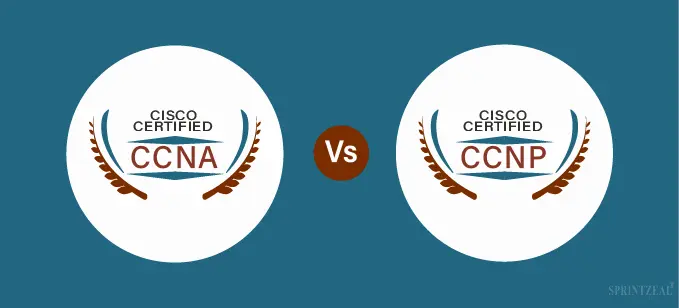The CCNP certification builds upon the foundation established by CCNA certification by expanding networking knowledge in areas like advanced routing, switching, troubleshooting and collaboration skills as well as automation and programmability knowledge.
CCNP certification is ideal for professionals seeking more challenging roles. It explores complex networking concepts while offering various specialisations, including routing and switching, security, data, collaboration, service provider and wireless.
1. CCNA is an Associate Level Certification
CCNA certification is an entry-level credential designed for networking professionals, validating their fundamental knowledge. The credential serves as a prerequisite to more advanced Cisco credentials like CCNP and CCIE; those holding it have an in-depth knowledge of network configuration as well as ability to troubleshoot basic issues.
For candidates to achieve CCNA Routing and Switching certification, two exams must be passed: the ICND1 100-105 and 200-105 exams. Each of these covers network fundamentals, routing protocols and IP services as well as wide area network technologies like OSPF/BGP as well as security fundamentals as well as automation programmability basics.
Professionals with CCNA credentials can work in various IT roles, including network engineering and administration. Insight reports that getting certified is especially useful for pursuing careers in cybersecurity or cloud technology – getting this certification provides a great start!
An IT industry certification such as CCNA can significantly expand your career opportunities and job prospects. Employers increasingly prioritize employees who understand basic networking principles when hiring talent; furthermore, certification can open doors into more senior and specialised positions within an organisation. Furthermore, its widespread recognition gives candidates an edge against other candidates competing for employment in this sector.
2. CCNP is a Professional Level Certification
CCNP certification from Cisco validates your depth and breadth of knowledge across specific technologies. With five tracks to choose from and two exams (core exam and concentration exam) needed for certification, this professional-level credential validates your expertise with networking technologies at enterprise-level environments allowing you to earn higher salaries while taking on more senior-level roles.
The CCNP exam is more advanced than its CCNA counterpart and requires both theoretical and practical skills for completion. It measures your ability to configure and troubleshoot various network devices – routers and switches alike – in addition to being familiar with network monitoring tools as well as understanding advanced routing protocols like MPLS.
To prepare for the CCNP exam, it is advisable to develop a study plan and take practice tests. You can find practice tests online or via Cisco’s official resources; taking them will allow you to identify any areas where more effort needs to be applied in your studies – ultimately increasing your odds of passing the exam. Likewise, joining a study group with other professionals preparing for it could also prove invaluable.
CCNP certification is vendor-specific; however, students often find their knowledge transferrable across other networking vendors as well. While Cisco dominates the industry and their technology can benefit students greatly.
3. CCNP is a Continuing Education Certification
The Cisco Certified Network Professional (CCNP) certification is intended for experienced network professionals with at least a year of experience working with Cisco networking equipment. This program offers intensive instruction on installing, maintaining, troubleshooting and repairing medium-sized networks as well as various Cisco services and technologies such as voice over IP (VoIP), wireless LANs routing switching security as well as IP security services and technologies.
CCNP certification is an advanced professional-level qualification. There are various tracks available, each one requiring you to pass two exams: firstly the core 350-401 ENCOR exam which tests knowledge of enterprise infrastructure; and then secondary concentration exams that allow you to specialize in specific fields of networking.
Preparation for the CCNP exam can be accomplished either through attending courses at network academies or conducting self-study. Many of these academies offer courses lasting several months and offering hands-on activities; alternatively you may use high-quality online resources and tools like GNS3 and Packet Tracer that provide ample preparation tools.
Take the CCNP exam at either a Pearson VUE testing center nearby or online proctor service provided by Pearson VUE. A reliable internet connection and meeting minimum hardware requirements will be needed in order to successfully take and pass this exam; once successful you will receive your certificate.
4. CCNP is a Job-Specific Certification
With networks becoming an ever more integral component of daily life, keeping up with networking technologies is essential. The Cisco Certified Network Professional (CCNP) certification is an excellent way to demonstrate your superior knowledge of Cisco devices while building up a career in IT. While obtaining it may require additional steps and costs than earning the CCNA credential, its advantages far outweigh these challenges and offer greater understanding across various networking topics.
CCNP certification provides job-specific knowledge that allows you to understand various components and architectures of Cisco networks, from wide area networks (WAN) and local area networks (LAN) to installation, troubleshooting and maintaining networks with 100 to 500 nodes. You’ll be taught how to design and implement complex infrastructures from Cisco as well as take up roles such as security, data collaboration service provider or wireless.
Your choice between the CCNA and CCNP certifications will depend on your unique circumstances and career aspirations. While CCNA may be suitable for beginners or IT professionals with limited experience, CCNP will equip you for higher-responsibility positions and more specialised jobs. Making an informed decision is paramount to becoming successful IT professional – having a solid grasp of the basics ensures long-term career success in tech.

